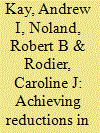| Srl | Item |
| 1 |
ID:
132687


|
|
|
|
|
| Publication |
2014.
|
| Summary/Abstract |
It is well established that GHG emissions must be reduced 50 to 80% by 2050 in order to limit global temperature increase to 2 °C. Achieving reductions of this magnitude in the transportation sector is a challenge and requires a multitude of policies and technology options. The research presented here analyzes three scenarios: changes in the perceived price of travel, land use intensification, and increases in transit. Elasticity estimates are derived using an activity-based travel model for the state of California and broadly representative of the US. The VISION model is used to forecast changes in technology and fuel options that are currently forecast to occur in the US for the period 2000-2040, providing a life-cycle GHG forecast for the road transportation sector. Results suggest that aggressive policy action is required, especially pricing policies, but also more on the technology side, especially increases in the carbon efficiency of medium and heavy-duty vehicles.
|
|
|
|
|
|
|
|
|
|
|
|
|
|
|
|
| 2 |
ID:
092614


|
|
|
|
|
| Publication |
2009.
|
| Summary/Abstract |
Concerns over increasing energy price, exacerbating power shortage and changing climatic conditions are emerging associated with municipal energy management systems. Most of the previous studies could hardly address multiple uncertainties that exist in such systems; this may lead to incomplete, simplified or even false solutions, and could jeopardize the robustness of management decisions. This study is to develop a dynamic inexact stochastic energy systems planning model (DITS-MEM) for managing municipal energy systems and greenhouse-gas (GHG) emissions under uncertainty. Through integrating mixed-integer, interval-parameter and two-stage stochastic programming techniques, DITS-MEM can handle not only the uncertainties expressed as interval values and probabilistic distributions associated with GHG-emission reduction targets, but also the dynamics of capacity-expansion issues. The developed model is then applied to the Beijing Municipality. The results suggest that the DITS-MEM model is applicable in reflecting complexities of multi-uncertainty, dynamic and interactive municipal energy management systems, and capable of addressing two-stage stochastic problem of GHG-emission reduction. The obtained solutions can provide decision bases for formulating GHG-reduction policies and assessing the associated economic implications in purchasing emission credits or bearing economic penalties.
|
|
|
|
|
|
|
|
|
|
|
|
|
|
|
|